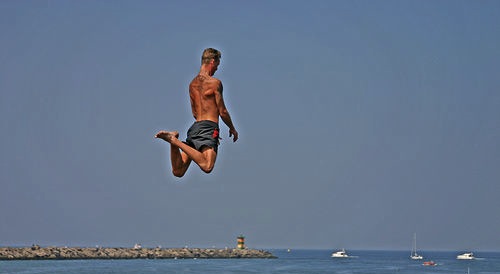I was talking with Johnny at Starbucks after we finished the Sylvania triathlon together this past weekend. We went back and forth about the race and blogging until he paused at one point and said, “You know Joel, I should point out, the things you do aren’t literally impossible things – they’re more like unlikely things. The fact that they’ve been done before actually proves they’re possible.”
I get this all the time from readers, friends and anyone who sees my impossible list. So we laughed about it as we came up with alternative titles for the blog – blog of improbable things, blog of somewhat possible things, etc. But as I drove home, I realized that Johnny’s not the first person who’s made that joke. And it’s interesting that the common truth in the joke is based in how deeply other people’s accomplishments define our perception of the impossible. Here’s what I mean:
Truly Impossible
Table of Contents
As little as a year and a half ago, running a triathlon seemed truly impossible to me. I had never run more than 3 miles. I had no context for being even able to comprehend what running more than 3 miles would look like. I had done exactly one (1) 5k in my life and would usually stop running my training runs around mile 2 due to severe shin splints, knee pain and my lungs generally wanting to explode.
Based on my previous personal experiences, it was impossible that I could run 3 more or more miles in a row. Much less add any other sport in the mix. At my first 5k ever, there was also a 15k race going on. I actually remember saying to myself, “Why would anyone ever want to run a 15k? That’s so far. That doesn’t even seem possible.”
But of course it was very posible. Hundreds of other people were doing *just that*, that very day. But to me, with my background, experiences, understanding and knowledge of the facts, it was impossible.
When you look at an individual with self-imposed limitations, it seems silly. When other people, external people, have proven that certain things are possible, and are actively doing them, why would someone choose to tell themselves it’s not possible?
But, based on that person’s experiences, understanding and facts on hand, that person’s world, a realm of limitations exist (real or not), that prevent them from actually doing what other people actually do. Other people’s successes don’t translate to their life if it doesn’t resonate internally. To them it literally is impossible.
But it doesn’t have to stay that way…
Experiences can change.
Understanding can change.
Facts can change.
Scaling Impossible
Of course it’s silly for an individual to not do something that other people are just because they tell themselves they can’t. Of course you can do a triathlon. Look at the thousands and thousands of people that do them each year! People of all shapes and sizes have done them before so it’s totally possible. All you have to do is to do it! And it seems so simple.
But somehow things change when we start to scale up and include more than just one person in this mindset.
Companies. Countries. Humans in general.
Just like an individual can convince themselves something’s impossible simply because they haven’t done it before, groups can do the same thing. If I don’t know that anyone in my group of people (co-workers, other citizens, humans) have done something before, it’s labeled “impossible.” Sure there might be some people out there that can do it, but nobody that we know and certainly no one like us.
Just like an individual, things that are literally impossible are based on limited experiences, understanding and facts on hand. Sure, with 6 billion people in the world, a group has a broader scope of experiences, understanding and facts, so we feel more comfortable making blanket statements about the impossible. So while it’s easy to make generalizations, the conclusions groups usually come to about what’s considered “impossible” is anything but conclusive. In fact, it’s not even close.
The result is that too many times the term is impossible is used to describe stuff that hasn’t been done yet, not things that can’t actually be done.
The word impossible isn’t a finality, it’s a challenge. Impossible isn’t a final judgment on the feasibility of something, but a challenge thrown down asking whether or not you’ll be the one to prove it wrong. So there’s something missing to the above statements. Something that the word impossible is constantly describing, but most people consistently leave out. The word “yet”.
When you realize impossible is a challenge, not a determination of ability, you realize the impossible is just the beginning. The statement changes from “it’s not possible” to “it’s not possible…yet”, and the whole meaning of it changes.
Just look what it does to the following statements:
It’s impossible because I can’t do it.
becomes
It’s impossible because I can’t do it…yet.
It’s impossible because I haven’t seen anyone do it.
becomes
It’s impossible because I haven’t seen anyone do it…yet.
It’s impossible because I don’t know anyone who’s done it.
becomes
It’s impossible because I don’t know anyone who’s done it…yet.
It’s impossible because no one has tried it.
becomes
It’s impossible because no one has tried it…yet.
It’s impossible because no one has succeeded.
becomes
It’s impossible because no one has succeeded yet…yet.
“Yet” changes everything.
Literally Impossible
A lot of cynics like to point that some things that are literally impossible. They’ve been proven. It’s science!
I like to point out that they’re giving up way too easily.
As much as I love science and the many technological advances we achieved in the last few hundred years because of it, science, at it’s very core, is only our feeble human attempt to understand and explain the world around us. To think science is the end-all, be-all of anything that will ever be is incredibly arrogant. In fact, science is a huge, colossal exercise in testing the limits of the seemingly impossible, realizing you were being wrong and going further into the impossible than you thought you could. A scientist’s job is to say “I think these things are possible, let me test them and find out.”
We would be nowhere if every scientist that ever lived said “Well this is exactly what everybody tells me is possible. That sounds good. I’ll just go with that.”If you make that assumption, you don’t challenge your assumptions, you don’t learn, you don’t get better and you never end up doing anything interesting, because you’re only doing things people have done before.
When we say “that’s literally impossible”, what we mean is “that’s physically impossible with our current understanding of how things work.” They’re literally impossible so far, maybe. Maybe. But, like we said, facts can change.
Change The Facts
It was literally impossible to go to the moon…until Neil Armstrong did it.
It was literally impossible for a person to run a four minute mile….then Roger Bannister did it. And so did almost 1200 other people.
It was literally impossible to break through the sound barrier…until Chuck Yeager did it.
I can keep naming feats that were at one point, literally impossible, but you get the picture. Sure it’s easy to look back now and say, “ah, that wasn’t literally impossible”, but up until the exact moment someone actually did it, it was very impossible to everyone involved. In hindsight, all those people who thought it was literally impossible to do those things look pretty silly now. But, the truth is someone needs to challenge the impossible in order for a break through to occur. Why not you? You need to be a little crazy, you need to be willing to look stupid, you need to be a little delusional. But why not? Especially if everyone else is just going to look really dumb in the future.
If you always do what you’ve always done, you’ll always get what you’ve always gotten.
If you base your actions solely on what’s been proven before, you’ll be stuck doing the same thing forever. Take new steps. Break new ground. Do something new. Something literally impossible.
Future possibilities depend on people like you challenging the impossible.
So what’s literally impossible? You tell me.
“It always seems impossible until its done.” – Nelson Mandela
***
If this post helps you tell a better story with your life, tell a friend and share this post with them in whatever way you like. Imagine if everyone tried to do something literally impossible and tell a great story with their life. What would happen?






I was just having the same thoughts about the truly “Impossible” and the perceived “Impossible.” A half-marathon seemed impossible to me about 10 weeks ago, but here I am, three days after (nursing a tendon injury) but having completed the run much faster than anticipated. Now that I’ve proved it’s possible, I’m going to do it again, and again, before this year is done.
And then you’ll go on to conquer the NEXT impossible thing. Keep it up Chris.
This was AWESOME. Just what I needed to hear.
Now what are you going to do?
Well said Joel. Impossible things live only in our own mind. If you’ve ever watched the show Stan Lee’s Superhumans it’s about people with extraordinary abilities that some would say are impossible. Like the guy who can get bit by poisonous snakes and not die. Or the guy who can shake hands with over 200 people and remember their all their names.
Sound impossible? It’s not. Is it impossible for me? I’ll never know unless I try (BTW…I don’t recommend letting a poisonous snake bite you).
That seems to be a test that you either only get to do once, or get to do all the times as a cool party trick. Unfortunately, those are the only two options 🙁
Joel, this post is so good it made my scalp tingle. I just pulled off a bit of “impossibility” by healing six stomach ulcers (and a badly inflamed stomach lining and irritated esophagus) in eight weeks – to the amazement of my doctor. At the risk of gilding the lily — because this post is AWESOME [wait? did I mention that? I did? Oh. Sorry. Where was I? Right!] seriously AWESOME — I’d just like to point out that even the people who did impossible things stood on the shoulders of other people who had tried and “failed” and others who just believed. Neil Armstrong didn’t just wake up and launch himself to the moon; there were hundreds of people working behind the scenes to make that happen. We lift one another up when we attempt things that seem “impossible,” and when we help others realize their own impossible dreams. As you do, Joel Runyon, every day, right here on this blog.
Thank you Deborah :). I believe doing impossible things yourself is the best way to help others do what they want most.
Reminds me of Graham over at theodysseyexpedition.com
http://www.youtube.com/watch?v=F-AhFkg2Bjw
Very cool story.
Fantastic post!
Had a similar experience with a fun run in Sydney last weekend. It was 14km, which seems simple now. But rewind a year and I hadn’t run further than 5km IN MY LIFE. I used to part way too much, with alcohol, cigarettes and various other substances. I would have burst out laughing if anyone said I’d be running 14km in a year.
We can never have 100% complete information. And without 100% complete information, all our beliefs about what’s impossible and what’s not are assumptions, based on an incomplete view of reality. As far as growth experiences go, we can’t beat challenging assumptions and doing what we thought was impossible.
Most impossible piece from your post – they have 14km races in Australia? Sort of an odd distance race, isn’t it?
http://en.wikipedia.org/wiki/City2Surf_%28Sydney%29
One of the biggest fun-runs in the world, going by the total entrants. Over 80k this year. The biggest problem was dodging people who were walking 😀
Holy Crap.
Oh Joel, as usual your words are encouraging. We create our own personal concept of “impossible” because we have not accomplished “it” yet. There are two very specific things that keep coming up that I have deemed impossible…first, acing the job interview that lands the perfect teaching job and second, losing my weight. But like you said, thousands of people interview and land jobs as well as lose weight.
Exactly. Thousands of people have done it before. Why can’t you? Good luck with everything 🙂
Whenever I hear someone say that nothing is impossible, I tell them that it is impossible for a person to eat planet Earth.
Of course there are tons of things that are literally impossible (eating the planet being just one of them). But the problem is that people toss around the word “impossible” too much, and I think that’s what your post is really about.
Why would you want to eat the planet? Sounds like it would taste terrible. The lava especially would probably burn the roof of your mouth. I hate that…
This was a great post. It is important to remember that you can often change the impossible to possible with just a bit of effort and planning, something that I love to do.
I love this post so much I’m even willing to overlook the use of the word literal in colloquial form.
That is love my friend. 😉
That literally might be the nicest thing you’ve ever told me 🙂
I think it would be really cool to create or destroy matter or energy. But it’s literally impossible